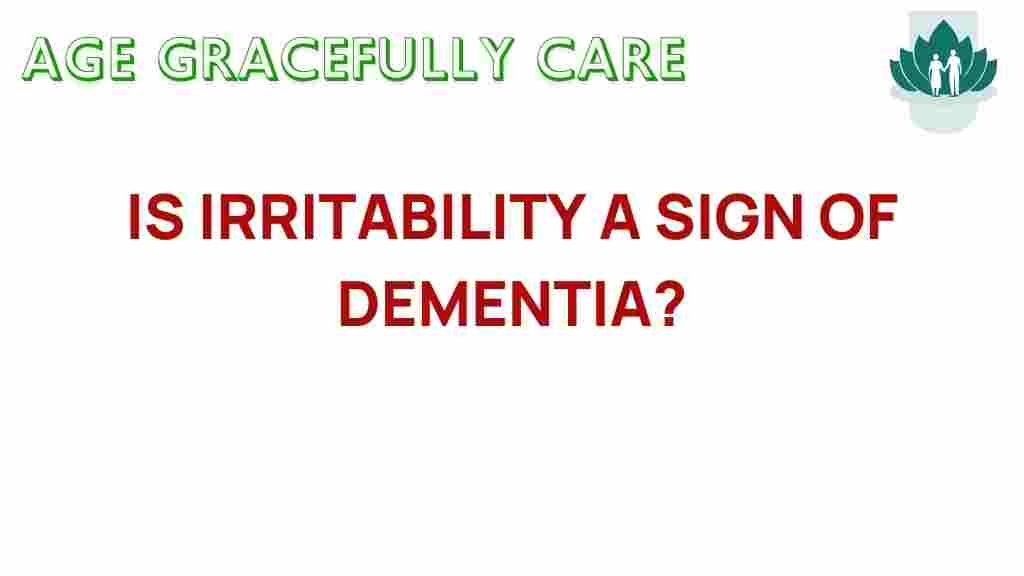Is Irritability a Hidden Indicator of Dementia’s Onset?
Dementia is a progressive condition that affects millions of individuals worldwide, particularly the elderly. As we age, it’s essential to recognize the subtle signs of cognitive decline. One often-overlooked symptom is irritability. This article will explore if irritability is a hidden indicator of dementia’s onset, along with its relationship to other emotional changes, behavioral signs, and the importance of early detection in mental health.
Understanding Irritability in the Context of Dementia
Irritability can manifest as frustration, anger, or mood swings that seem disproportionate to the situation at hand. In the context of dementia, irritability may be one of the first behavioral signs noticed by family members or caregivers. Understanding this symptom is crucial for elderly care and mental health management.
Common Symptoms of Dementia
Dementia encompasses a wide range of symptoms beyond irritability. Here are some common indicators:
- Memory Loss: Frequently forgetting recent events or important dates.
- Difficulty with Language: Struggling to find the right words or following conversations.
- Disorientation: Confusion about time, place, or even familiar faces.
- Changes in Mood: Sudden emotional changes or mood swings.
- Withdrawal: Losing interest in previously enjoyed activities or social interactions.
The Connection Between Irritability and Cognitive Decline
Irritability can be a significant indicator of cognitive decline. As dementia progresses, individuals may feel frustrated by their inability to perform tasks or remember things. This frustration can lead to irritability, making it essential to monitor this symptom closely.
Emotional Changes Associated with Dementia
Alongside irritability, other emotional changes can signal the onset of dementia:
- Apathy: A lack of interest or enthusiasm for activities.
- Depression: Feelings of sadness that persist over time.
- Anxiety: Increased worry about health, safety, or changes in daily routines.
Recognizing these emotional changes is vital for early detection and intervention. For more information on emotional health and dementia, you can visit Alzheimer’s Association.
Behavioral Signs of Dementia
In addition to irritability, several behavioral signs may indicate dementia:
- Repetitive Questions or Statements: Asking the same thing over and over again.
- Misplacing Items: Frequently losing personal belongings in unusual places.
- Changes in Sleep Patterns: Experiencing insomnia or excessive sleeping.
- Increased Dependency: Relying heavily on others for decision-making or daily tasks.
How to Detect Irritability and Other Symptoms Early
Early detection of irritability and other symptoms can significantly impact the management of dementia. Here’s a step-by-step process to help families and caregivers:
- Observe Behavioral Changes: Keep a journal of any changes in mood, irritability, or behavior over time.
- Engage in Open Communication: Discuss observations with the individual in a calm and understanding manner.
- Consult a Healthcare Professional: Schedule an appointment with a doctor or mental health specialist for evaluation.
- Seek Support Services: Look into local support groups or resources for caregivers and families.
Troubleshooting Tips for Managing Irritability
If you notice irritability in an elderly loved one, consider these troubleshooting tips:
- Stay Patient: Understand that irritability may stem from frustration with cognitive decline.
- Establish Routines: Create a predictable daily schedule to minimize confusion and anxiety.
- Encourage Social Interaction: Engage the individual in social activities to combat feelings of isolation.
- Promote Physical Activity: Regular exercise can improve mood and overall well-being.
The Importance of Early Detection
Early detection of irritability and other symptoms of dementia is crucial for effective management. Here’s why:
- Access to Treatment: Early diagnosis can lead to timely interventions, including medications or therapies that may slow cognitive decline.
- Improved Quality of Life: Managing symptoms early can lead to better mental health and emotional stability.
- Support for Caregivers: Understanding the condition can help caregivers seek the necessary support and resources.
Conclusion
Irritability can indeed serve as a hidden indicator of the onset of dementia. By understanding this symptom in the context of other emotional changes and behavioral signs, families and caregivers can be better equipped for elderly care. Early detection is vital, and through observation, communication, and consultation with healthcare professionals, it’s possible to manage symptoms effectively. If you or someone you know is experiencing irritability alongside other cognitive decline symptoms, consider reaching out to a healthcare provider for guidance.
For more information on caring for someone with dementia, check out this helpful resource.
This article is in the category Health and created by AgeGracefullyCare Team

1 thought on “Is Irritability a Hidden Indicator of Dementia’s Onset?”